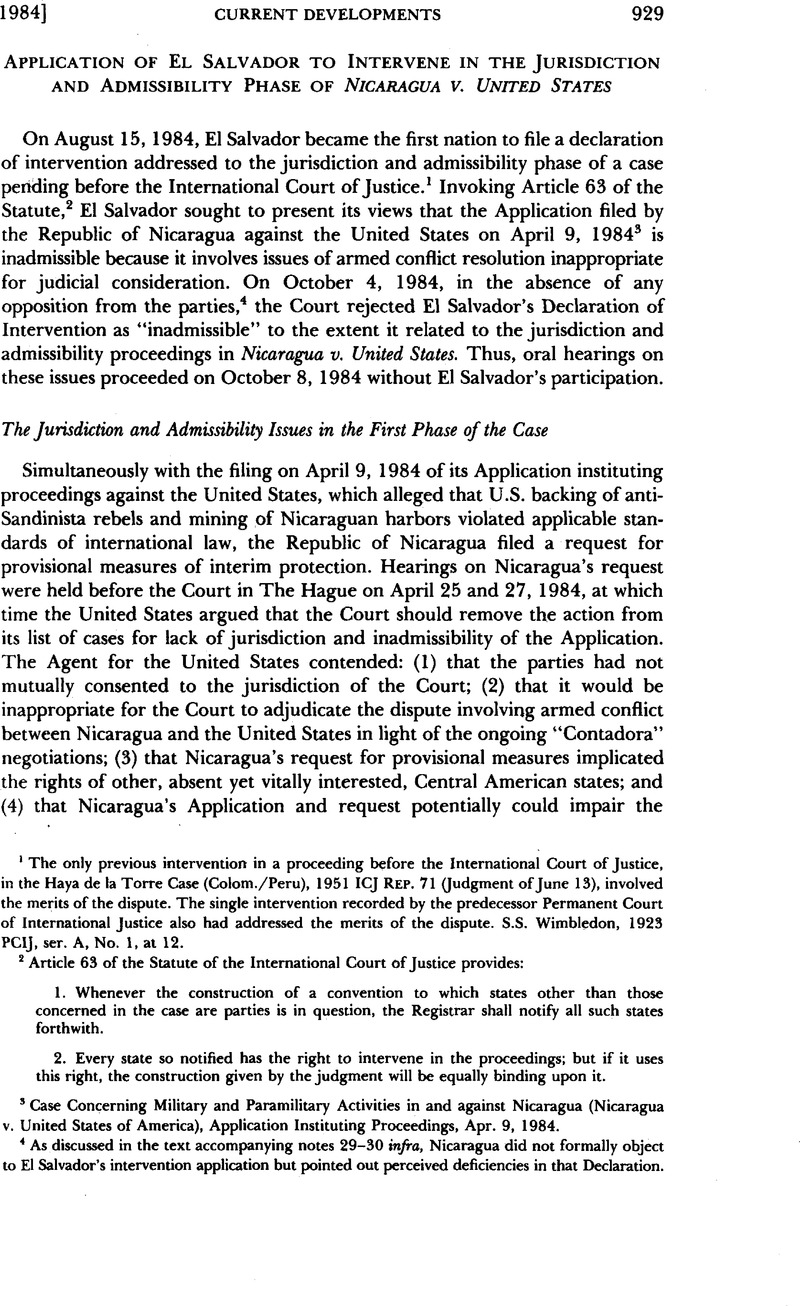Article contents
Application of el Salvador to Intervene in the Jurisdiction and Admissibility Phase of Nicaragua v. United States
Published online by Cambridge University Press: 16 May 2017
Abstract

- Type
- Current Developments
- Information
- Copyright
- Copyright © American Society of International Law 1984
References
1 The only previous intervention in a proceeding before the International Court of Justice, in the Haya de la Torre Case (Colom./Peru), 1951 ICJ REP. 71 (Judgment of June 13), involved the merits of the dispute. The single intervention recorded by the predecessor Permanent Court of International Justice also had addressed the merits of the dispute. S.S. Wimbledon, 1923 PCIJ, ser. A, No. 1, at 12.
2 Article 63 of the Statute of the International Court of Justice provides:
-
1.
1. Whenever the construction of a convention to which states other than those concerned in the case are parties is in question, the Registrar shall notify all such states forthwith.
-
2.
2. Every state so notified has the right to intervene in the proceedings; but if it uses this right, the construction given by the judgment will be equally binding upon it.
3 Case Concerning Military and Paramilitary Activities in and against Nicaragua (Nicaragua v. United States of America), Application Instituting Proceedings, Apr. 9, 1984.
4 As discussed in the text accompanying notes 29–30 infra, Nicaragua did not formally object to El Salvador’s intervention application but pointed out perceived deficiencies in that Declaration.
5 ICJ Public Sitting, Apr. 27, 1984, at 10 A.M., Verbatim Record, passim.
6 Case Concerning Military and Paramilitary Activities in and against Nicaragua (Nicaragua v. United States of America), 1984 ICJ Rep. 169, 186–87 (Provisional Measures Order of 10 May).
7 Id. at 179–80.
8 Id. at 185–86.
9 Id. at 187.
10 Case Concerning Military and Paramilitary Activities in and against Nicaragua (Nicaragua v. United States of America), Declaration of Intervention of the Republic of El Salvador, Aug. 15, 1984, at 1–2 [hereinafter cited as Declaration].
11 Id. at 15–18. Article 36(2) of the Court’s Statute provides:
-
2.
2. The states parties to the present Statute may at any time declare that they recognize as compulsory ipso facto and without special agreement, in relation to any other state accepting the same obligation, the jurisdiction of the Court in all legal disputes concerning:
-
a.
a. the interpretation of a treaty;
-
b.
b. any question of international law;
-
c.
c. the existence of any fact which, if established, would constitute a breach of an international obligation;
-
d.
d. the nature or extent of the reparation to be made for the breach of an international obligation.
-
a.
12 Declaration, supra note 10, at 17.
13 Id. at 13, 17, 18, 20.
14 ICJ Public Sitting, Apr. 27, 1984, at 4 P.M., Verbatim Record, at 13.
15 Id. at 2.
16 Letter of Sept. 10, 1984 to the Honorable Santiago Torres Bernárdez, Registrar, International Court of Justice, The Hague, from Ivo P. Alvarenga, Ambassador, Salvadoran Agent to the International Court of Justice.
17 Id.
18 Id.
19 Id. See note 2 supra.
20 Letter of Sept. 10, 1984, supra note 16.
21 Id.
22 See note 1 supra.
23 Article 86 of the Rules of the International Court of Justice addresses when an intervenor can receive the pleadings that are not on the public record:
-
1.
1. If an intervention under Article 63 of the Statute is admitted, the intervening State shall be furnished with copies of the pleadings and documents annexed, and shall be entitled, within a time-limit to be fixed by the Court, or by the President if the Court is not sitting, to submit its written observations on the subject-matter of the intervention.
-
2.
2. These observations shall be communicated to the parties and to any other State admitted to intervene. The intervening State shall be entitled, in the course of the oral proceedings, to submit its observations with respect to the subject-matter of the intervention.
For the Rules of Court adopted on Apr. 14, 1978, see 73 AJIL 748 (1979).
24 Letter of Sept. 10, 1984, supra note 16.
25 Permanent Court of International Justice, Advisory Committee of Jurists, Procès–Verbaux of the Proceedings of the Committee, June 16–July 14, 1920, at 746.
26 Fitzmaurice, , The Law and Procedure of the International Court of Justice, 1951–4, 34 Brit. Y.B. Int’l L. 1, 127 (1958)Google Scholar.
27 Elias, T., The International Court of Justice and Some Contemporary Problems 93 (1983)CrossRefGoogle Scholar.
28 Letter of Sept. 14, 1984 to Mr. Santiago Torres Bernárdez, Registrar, International Court of Justice, The Hague, from Davis R. Robinson, Agent of the United States of America.
29 Written Observations of Nicaragua on the Declaration of Intervention of the Republic of El Salvador, Sept. 14, 1984.
30 Id.
31 Article 84(2) of the Court’s Rules provides as follows: “If, within the time–limit fixed under Article 83 of these Rules, an objection is filed to an application for permission to intervene, or to the admissibility of a declaration of intervention, the Court shall hear the State seeking to intervene and the parties before deciding.” For the Court’s Rules, see note 23 supra.
32 Letter of Sept. 17, 1984 to the Honorable Santiago Torres Bernárdez, Registrar, International Court of Justice, The Hague, from Ivo P. Alvarenga, Ambassador, Agent to the International Court of Justice.
33 Id.
34 Id.
35 Id.
36 Case Concerning Military and Paramilitary Activities in and against Nicaragua (Nicaragua v. United States of America), Order of Oct. 4, 1984.
- 1
- Cited by


